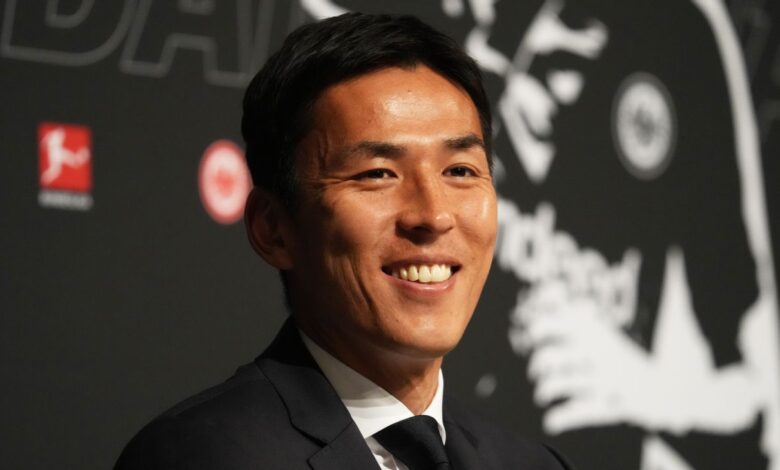Why Hasebe could be first Asian manager of a top European club

-
Gabriel Tan
Jul 22, 2024, 01:00 AM ET
At the end of last season, the stellar playing career of Japan international Makoto Hasebe finally came to an end.
While he might not have stolen the headlines in the way more attack-minded teammates of his generation — such as Shinji Kagawa and Keisuke Honda — did, Hasebe’s credentials speak for themselves. A Bundesliga champion with Wolfsburg in 2009, Hasebe would captain Japan at three consecutive editions of the FIFA World Cup and win an AFC Asian Cup en route to 114 international appearances, making him Samurai Blue’s seventh most-capped player.
Enjoying the most longevity at Eintracht Frankfurt, the midfielder-turned-sweeper would add a DFB-Pokal and Europa League to his trophy cabinet and hung up his boots with the accolade of being the Bundesliga’s record Asian appearance maker.
The esteem he was held in at Frankfurt led to a unique arrangement where his playing contract would automatically be renewed each summer until Hasebe himself decided to retire, where a coaching deal would then be guaranteed. That agreement has now come into effect, with the 40-year-old earlier this month being announced as an assistant coach of Eintracht’s under-21 team.
With that, Hasebe has taken his first step down a path that could eventually see him buck a peculiar trend in football. Be it through subconscious aversion or sheer coincidence, no Asian has taken charge of a notable European club. This, even though players from the continent have long been deemed good enough to make the grade in Europe, while Asian teams — mostly through the World Cup — have shown they have what it takes to match more-illustrious counterparts.
There are certainly candidates that ordinarily would have at least been in the reckoning.
While he has his fair share of critics for tactics that have at times been perceived as overly conservative, Japan coach Hajime Moriyasu did mastermind stunning wins over both Germany and Spain at the last World Cup.
Meanwhile, although Ange Postecoglou has deserved all the success he has enjoyed since his rise to prominence began at Yokohama F. Marinos, it is worth noting that the one J1 League title he won during his time in Japan was actually bettered by Toru Oniki’s two with Kawasaki Frontale. Oniki, with 10 major trophies to his name, is now the most successful manager in a country currently ranked 18th in the world. Yet, few outside of Japan probably have heard of him.
On the back of the sport’s ever-growing globalisation, that could soon change.
Postecoglou undeniably showed that Asian football can now be a legitimate bedrock of managerial talent. The City Football Group’s expansive network — which includes stakes in four Asian clubs including Marinos — suggests they too believe there is untapped potential. The ever-increasing interest in the Saudi Pro League also guarantees a greater spotlight for whoever excels in those newly glamourous surroundings.
Still, perhaps Hasebe is the best chance given his distinct advantage, especially over other candidates from the Asian Football Confederation: he is already “in.”
Through the credit he accumulated for himself as a player who was well-respected and regarded as a role model, his pathway has now been accelerated as he begins his coaching journey directly in Europe. There will be no need for him to work his way up back home in Japan, even if his subsequent steps may perhaps see him earn later job experience in the J1 League.
For now, Hasebe’s formative steps as a coach will not only be in one of Europe’s big five leagues but also at a well-established club in Eintracht, who were one of the Bundesliga’s founding teams and have only spent six seasons out of the top flight in the 60-odd years since the competition was established.
This will undoubtedly stand him in good stead but, at the end of the day, it will be the managerial talent that Hasebe develops that determines his success — and early signs are promising. Long regarded as a coach in the making, Hasebe was a leader all throughout his career — initially as a driving force in the heart of midfield, before he became a calming presence as the last line of defence in his final few seasons. He set an example for those around him to follow and was regularly seen giving instructions and advice both on the field or from the sidelines.
Ex-Eintracht manager Adi Hütter once labelled Hasebe as an “absolute godsend” and “outstanding” as both a footballer and person, while another former coach in Oliver Glasner — now Crystal Palace boss — spoke of his ability to always be relied upon.
Even his teammates were said to have affectionately referred to him as “Methuselah” — the biblical figure claimed to have lived the longest life until dying at the age of 969 — for his longevity.
Determined and ambitious, Hasebe has made no secret about his goal to one day reach the very top, having stated at his retirement news conference back in May that his ultimate goal was to manage Eintracht.
In doing so, he will have to buck a trend and reverse an anomaly that has stymied the growth and recognition of Asian football. He may just be the best and — eventually most well-equipped — managerial prospect to do so.



